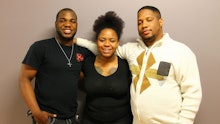What Young People on the Ground Think of the Uprising in Baltimore

As police cordoned off some parts of the city late Monday, Baltimore smelled like burning embers. I watched a store in flames as residents waited for the fire department to show up. People driving and walking by stopped to watch in astonishment as a business smoldered. There were no possible suspects in sight. No raucous black youth around to blame. No one present unaffected by the flames. There was laughter, but it was the type that comes when words cannot be found — a laughter signaling the exasperation among so many present who knew a hard truth: This was bound to happen.
But while scenes of burning buildings and cars dominated much of the media, the people affected by Freddie Gray's death and the subsequent unrest in Baltimore have been less visible. People like 22-year-old Markese Barnett, whom I met as he filmed a fire on Pennsylvania Avenue using his cellphone, looked like he was in shock, his eyes glassy and his face somber.
This is what injustice looks like: young black people grieving in the midst of circumstances that appear unresolvable.
Transformative justice, on the other hand, looks like the work of Dayvon Love, Trey Murphy and Michaela Brown. I talked to these, and other, young people in Baltimore on Monday night. They told me Gray's tragic death by police is the culmination of a larger set of precipitating causes, like the Baltimore Police Department's longstanding abuse within black communities.
"People aren't talking about the pain people in the communities feel," 27-year old Love, director of public policy at Leaders of a Beautiful Struggle, told Mic. "Freddie Gray is symbolic of the violence they have been subject to that is the source of their pain ... I think what we're seeing right now are the conditions that have brewed this anger. I would say we're lucky this didn't happen sooner."
The sound of noisy fire trucks moving along the streets of Baltimore's west side was largely absent in other neighborhoods where businesses and mostly white or middle-class neighborhoods are situated. It was clear while driving through the city that isolated and economically devastated black neighborhoods like Sandtown-Winchester, where Gray lived, stand in stark contrast to mostly white and well-resourced enclaves like Bolton Hill — another tension emphasized by young residents I spoke with.
"The issue of police brutality in West Baltimore, and more specifically, in Gilmore Homes, is very serious, which is why Freddie Gray would felt compelled to run if he saw a cop," Brown, 22, who is an organizer with Baltimore BLOC, told Mic.
"Most people are at home, in the suburbs, sitting on their couch, watching all of this on the news, but this is a terror we feel and experience every day. This isn't new for people in Baltimore city. This isn't new for people in Gilmore Homes. This is an everyday thing."
Mostly, they emphasized the hypocritical importance placed on property over humanity. "I think folks also aren't recognizing that there's a higher value on property than there is on human life. Now people are outraged property is being destroyed, but they aren't outraged, or publicly ashamed at the death of Freddie Gray," Murphy, 19, a member of Baltimore United for Change, told Mic.
Baltimore's young people have a voice, and they are saying: When systemic issues like police brutality are allowed to fester until they become ugly scabs, we should not be shocked when the affected begin to rage. Store windows have been broken, but not the spirit of those fighting for justice.
"In the spirit of Martin Luther King, who said that riots are the voice of the voiceless, people here don't feel like they have a voice," Murphy said. "They've tried protesting. They've tried going to elected officials and lobbying for change and when all of that fails, what do you expect? These young people's voices have been silenced and suppressed for so long that it was no surprise to me that this is the response."